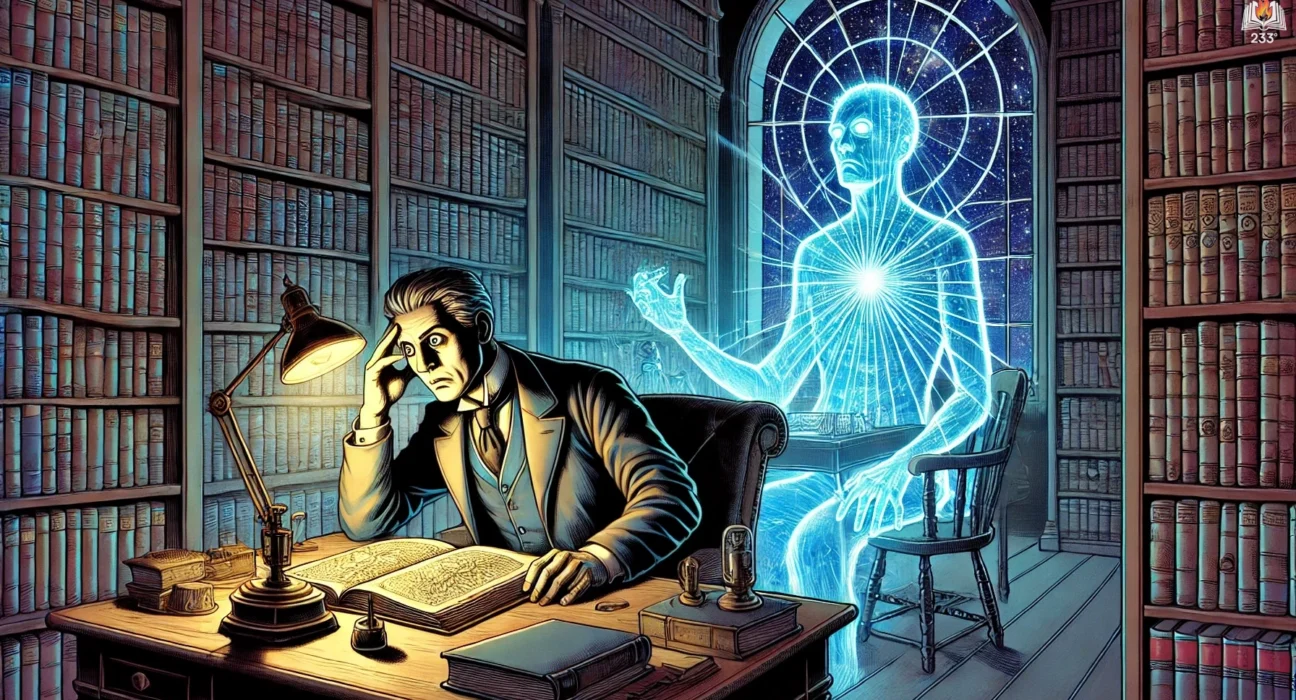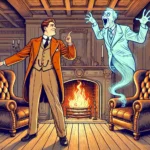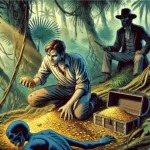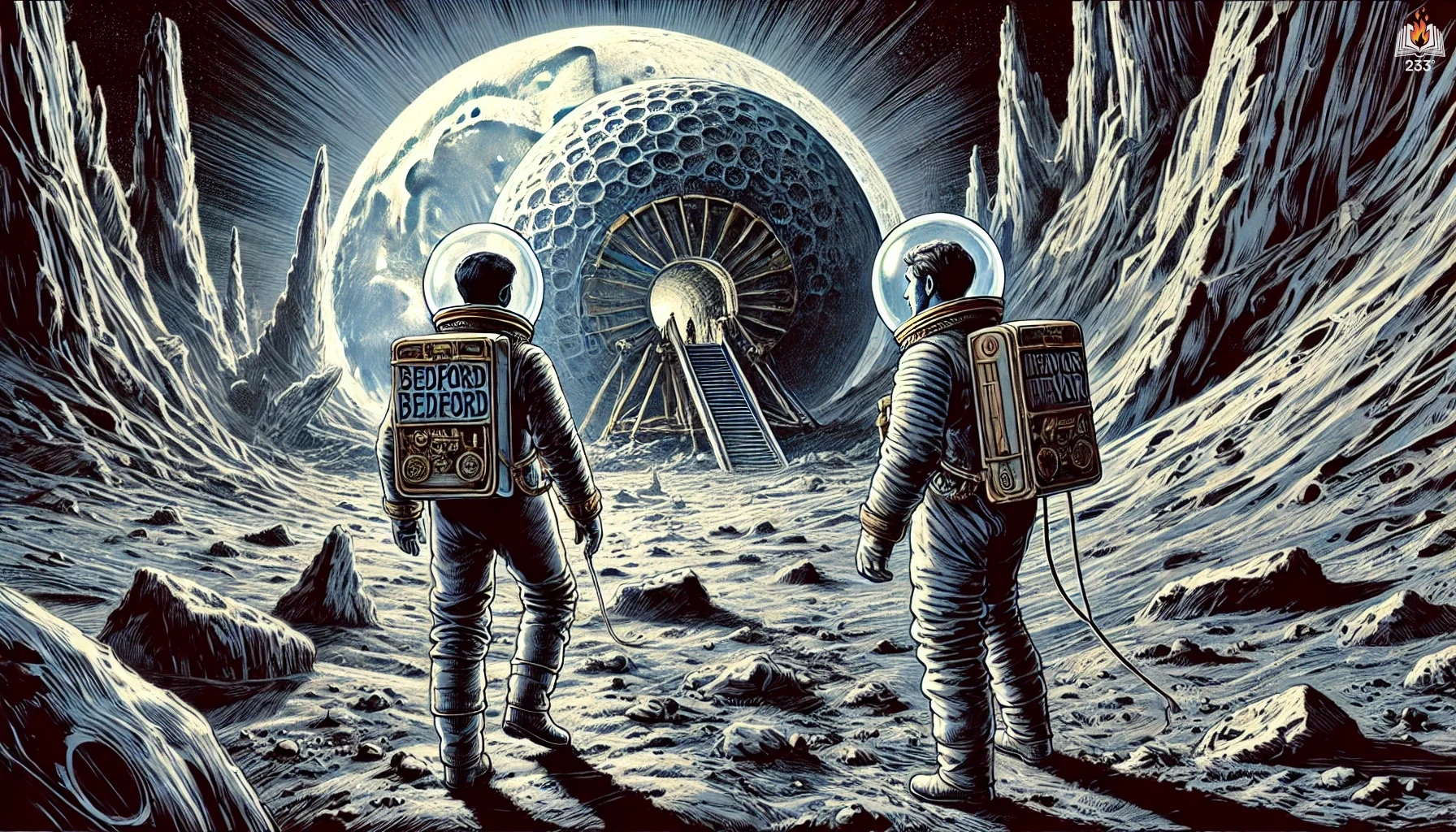Star Begotten is a 1937 science fiction novel by H.G. Wells, one of the key figures in the development of speculative fiction. Set in a time of growing interest in extraterrestrial life and cosmic science, Star Begotten explores the idea of human minds being altered by Martians through cosmic rays, subtly influencing and evolving humanity. The novel blends Wells’ classic interest in science with philosophical musings on human existence, societal change, and paranoia. It captures a tone of existential curiosity and skepticism as characters grapple with the implications of being star-begotten, or influenced by extraterrestrial forces.
Plot Summary
Joseph Davis, a historian and writer, led a life of intellectual pursuit, content in his observations of history and human nature. His mind, however, was increasingly troubled by a growing sense of uncertainty. It wasn’t an external crisis that plagued him, but rather an internal one, a nagging idea that gnawed at him, one he couldn’t easily shake off. He began to believe that something was changing humanity—quietly, invisibly, but profoundly. The source of this change, he speculated, might not be earthly at all. It was a bizarre notion, the kind that would be dismissed by most people, but Joseph’s mind was fragile, worn down by the pressures of his work and a life of intellectual rigor.
The idea struck him during a conversation at the Planetarium Club, a place where he often retreated to engage in discussions about science, society, and the workings of the universe. The club, filled with academics and intellectuals, often hosted conversations about the latest scientific discoveries. It was during one such gathering that Joseph’s thoughts took a dramatic turn. A discussion about cosmic rays—the invisible particles that constantly bombard the Earth from outer space—sparked a strange idea in his mind. These rays, capable of penetrating matter, might, Joseph thought, also be capable of penetrating minds. And what if they weren’t just random particles, but deliberate influences sent by beings from Mars? The notion that cosmic rays could be altering human consciousness lodged itself firmly in Joseph’s thoughts.
This idea unsettled him deeply. He began to wonder if humans were no longer entirely human—if they were being slowly, imperceptibly changed by some Martian influence, made more like the inhabitants of another world. The more Joseph thought about it, the more it seemed plausible. After all, the human race had been evolving for millennia. What if this evolution had been guided, not by nature, but by some other intelligence, one far beyond the comprehension of humans? What if, instead of simply observing human life, the Martians were subtly manipulating it, shaping humanity to better suit their own purposes?
Joseph’s musings took on a more personal nature when he looked at his wife, Mary. She was pregnant, and with this impending arrival, Joseph’s fears about the future intensified. He began to see Mary’s behavior in a different light. Was her growing detachment from him part of this alien influence? Was the child she carried entirely human, or was it somehow different, star-begotten, shaped by forces from another world? He struggled with these questions, but Mary offered no solace. Her calm, quiet demeanor only added to his sense of unease. She seemed unchanged, unbothered by the strange forces that Joseph believed were at work. This, in turn, made him feel even more isolated, as though he were the only one who could see the truth.
Joseph sought reassurance from Dr. Holdman Stedding, the doctor overseeing Mary’s pregnancy. Stedding, a practical man, dismissed Joseph’s concerns as the overactive imagination of a man under stress. The child was healthy, he insisted, and there was no reason to worry. But Joseph could not be comforted by such reassurances. The doctor’s calm dismissal of his fears only deepened his conviction that something extraordinary was happening, something beyond the reach of normal understanding.
His thoughts began to spiral further into paranoia. He considered the idea that the Martians, far more advanced than humanity, might not need to physically invade Earth, as in old tales of interplanetary conquest. Instead, they could achieve their goals by changing humanity from within, making the race Martian in mind and spirit, if not in body. The cosmic rays, Joseph reasoned, were the Martians’ method of quietly infiltrating human life, altering thoughts, feelings, and even genetics over time.
As these ideas consumed him, Joseph’s behavior began to change. His work, once his refuge, now felt pointless. How could he continue writing about history when the future of humanity seemed so uncertain, when the very nature of human life might be shifting into something alien? His sense of purpose was eroding, and his connection to the world around him was fraying. He no longer trusted his own perceptions, unsure whether what he saw and felt was real or a result of the changes he suspected were occurring.
One evening, Joseph found himself reflecting on the conversations he had had at the club. The notion of cosmic rays as carriers of Martian influence no longer seemed far-fetched. He began to think about mutations, the small, often imperceptible changes that occur in nature over time. Could these cosmic rays be responsible for the mutations that scientists observed in human genetics? Were they creating not random changes, but deliberate ones, guided by an alien intelligence with designs on the future of the human race?
Joseph’s mind, once so sharp and clear, now teetered on the edge of obsession. The lines between reality and imagination blurred as he grappled with the possibility that his own mind might already be altered. He began to see signs of this Martian influence everywhere—strange behaviors in people he knew, odd coincidences, shifts in the way people thought and acted. His paranoia grew, feeding on itself, until it seemed that the entire world was conspiring to keep the truth hidden.
In his darkest moments, Joseph contemplated the future. What kind of world would his child be born into? Would it be a world still recognizable as human, or would it be a world shaped by the will of unseen Martians? The thought terrified him, but there was no escape from it. The child, he realized, might already carry within it the seeds of this alien influence, might already be part of a new kind of humanity, one shaped not by Earth, but by the stars.
As his mind raced, Joseph found himself standing on the precipice of a new understanding, but it was an understanding that offered no comfort. The idea of being star-begotten—of being changed by forces beyond his control—was too much to bear. Yet, even as he struggled against it, the idea took root in his mind, and there was no way to turn back
Main Characters
Joseph Davis: The protagonist, an historian and writer, whose reflective, sensitive nature becomes increasingly obsessed with the possibility that cosmic rays from Mars are altering humanity. His neurasthenia, combined with his intellectual inclinations, propels him into a spiral of paranoia and questioning, making him the primary lens through which the novel’s ideas unfold.
Mary Davis: Joseph’s wife, who is pregnant and seems emotionally distant and enigmatic to her husband. Her relationship with Joseph reflects his growing anxiety about change and alien influence, as she becomes symbolic of the uncertainty and unfamiliarity Joseph feels about the world around him.
Dr. Holdman Stedding: An obstetrician who serves as a confidante for Joseph Davis. He is more pragmatic and dismissive of Joseph’s ideas about cosmic rays but provides a scientific counterbalance to Joseph’s speculative thoughts.
Foxfield: A biologist and intellectual who discusses mutations and cosmic rays with Joseph, contributing to the growing sense of cosmic influence on human evolution. His scientific perspectives feed into the novel’s broader questions about science and its impact on human destiny.
Theme
Cosmic Influence and Evolution: One of the central themes in Star Begotten is the idea that humanity might be influenced and altered by external cosmic forces, specifically Martians using cosmic rays to change human genetics. This reflects Wells’ ongoing interest in evolution and the potential for external forces to shape human destiny, moving beyond Darwinian principles into speculative territory about extraterrestrial life.
Paranoia and Identity: Joseph Davis’s journey through the novel reflects the theme of paranoia. His fear that humanity is being altered without its knowledge touches on deep anxieties about control, identity, and autonomy. The novel examines how fear of the unknown—particularly the idea that unseen forces are changing who we are—can unravel a person’s sense of self.
Science and Speculation: Star Begotten explores the boundary between scientific fact and speculative theory. Through conversations about cosmic rays, mutations, and Martian influence, the novel blurs the line between what is known and what could be. It questions the role of science in society, and how far scientific thought should extend into the unknown before becoming mere conjecture.
Social Commentary and Disillusionment: As in many of Wells’ later works, Star Begotten also reflects his disillusionment with society. Through Joseph Davis’s musings, Wells critiques human complacency, social stagnation, and the potential for humanity to become passive or even manipulated by forces beyond its understanding. This links to broader themes of cultural and intellectual decline.
Writing Style and Tone
H.G. Wells’s writing in Star Begotten blends his characteristic speculative style with a more introspective and philosophical tone. The novel is less action-driven compared to his earlier works like The War of the Worlds or The Invisible Man and focuses instead on dialogue and internal monologues. Wells uses Joseph Davis’s reflective thoughts and conversations with other characters to explore big ideas—about science, the mind, and human evolution—creating a novel that is more cerebral than adventurous.
Wells employs a tone of unease and quiet skepticism throughout Star Begotten. There is a subtle undercurrent of dread that permeates the novel, driven by Joseph’s increasing paranoia. The cosmic rays become a metaphor for the unseen forces that could be manipulating human life, and the writing mirrors this sense of uncertainty. Wells keeps the narrative focused on intellectual discovery, slowly unraveling the layers of the protagonist’s thoughts to build a quiet tension, rather than focusing on outright horror or alien invasions.
We hope this summary has sparked your interest and would appreciate you following Celsius 233 on social media:
There’s a treasure trove of other fascinating book summaries waiting for you. Check out our collection of stories that inspire, thrill, and provoke thought, just like this one by checking out the Book Shelf or the Library
Remember, while our summaries capture the essence, they can never replace the full experience of reading the book. If this summary intrigued you, consider diving into the complete story – buy the book and immerse yourself in the author’s original work.
If you want to request a book summary, click here.
When Saurabh is not working/watching football/reading books/traveling, you can reach him via Twitter/X, LinkedIn, or Threads
Restart reading!








